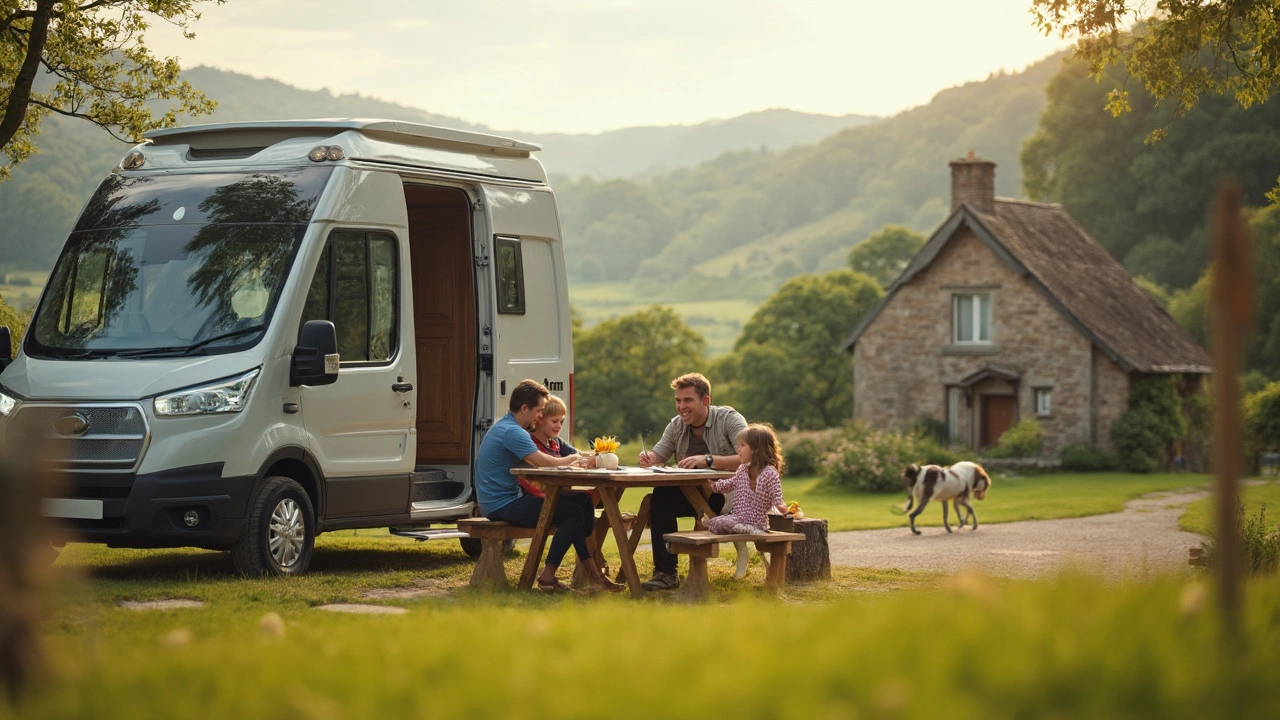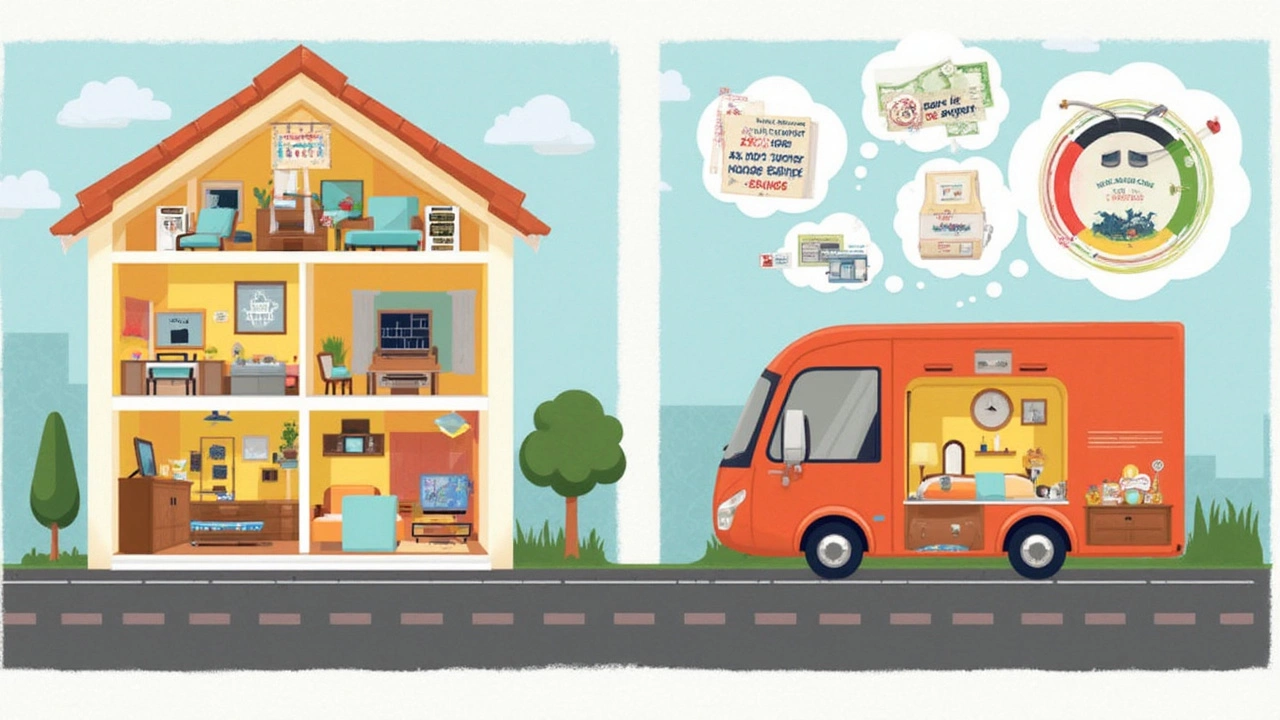Is It Cheaper to Live in a Camper Than a House?
 Jun, 2 2025
Jun, 2 2025
If you’ve ever checked your mortgage statement and thought, “There’s got to be a cheaper way to do this,” you’re not alone. The idea of swapping a house for a camper sounds tempting, especially when you scroll past those families on Instagram living their best life by a lake.
But is it actually cheaper to live in a camper than in a full-blown house? The answer’s not as simple as it seems—there are some costs that sneak up on you, while others disappear completely when you ditch the bricks and go mobile. It depends on how you do it, how often you move, and even the number of people and pets you pile into your rolling home.
Let’s get into what you’d really shell out for both setups so you don’t get blindsided by fees or run out of propane in the mountains. We’ll look at what you pay upfront, how the monthly bills stack up, which expenses hide below the surface, and how practical camper living is for a whole family. If you’re trying to save real money—and not just chase an adventure—knowing these numbers is key.
- Initial Costs: Buying a Camper vs. Buying a House
- Monthly Living Expenses: Bills, Utilities, and Storage
- Unexpected Costs and Hidden Savings
- Family Life on the Road: Is It Worth It?
Initial Costs: Buying a Camper vs. Buying a House
The sticker shock hits hard, whichever way you go. Let’s talk numbers: The typical price for a new travel trailer (the kind you tow behind an SUV or truck) lands between $25,000 and $50,000. Motorhomes, especially bigger Class A types, can start at $100,000 and reach way over $250,000. If you want to keep it tight, plenty of families grab a used camper for $10,000 to $30,000. Don’t forget—if you don’t already have a hefty vehicle for towing, that’s another $20,000 to $40,000 for something like a used pickup.
Now compare that to buying a house. The median home price in the U.S. in early 2025 sits at $412,000, up a bit from 2024. You’ll likely need a down payment (usually 10-20%), which alone can set you back $40,000 to $80,000 before moving in. Then you’ve got closing costs, often 2-5% of the home price, so there goes a few grand more. Even if you buy a tiny starter home in a rural spot, you’re probably still above what you’d spend on even a super-nice new camper.
Here’s a quick breakdown of the average upfront costs:
| Item | Average Cost (USD) |
|---|---|
| Used Travel Trailer | $10,000 - $30,000 |
| New Travel Trailer | $25,000 - $50,000 |
| New Class A Motorhome | $100,000 - $250,000+ |
| Tow Vehicle (used pickup) | $20,000 - $40,000 |
| Median House Down Payment (10-20%) | $40,000 - $80,000 |
| Median Home Total Price | $412,000 |
| House Closing Costs | $8,000 - $20,000 |
There are other things you’re going to buy, no matter where you land—furniture, insurance, maybe stuff like new tires for the RV or a backyard fence for a house. But the main thing is the gap in upfront cash. Going camper living can put the dream of “owning” your own space a lot closer for most folks, just because you’re not locking yourself into a mortgage for decades.
One more thing—campers drop in value pretty quick, like cars. Houses, on the other hand, usually go up over time (slowly, unless you catch a housing market spike). So, if turning every dollar into an investment is your priority, that’s worth thinking about. But if your goal is simply to pay less and get moving sooner, campers are hard to beat on initial costs.
Monthly Living Expenses: Bills, Utilities, and Storage
Now here’s where things get real. You can’t just compare mortgage versus a camper payment and call it settled—the monthly costs sneak up in all sorts of ways. So, how do the bills stack up if you’re living in a camper versus a house?
In a regular home, you’ve got your main bills: mortgage or rent, electricity, water, sewer, trash, internet, and maybe HOA fees. A 2024 national survey showed that the average American household spends around $2,500 a month just to keep a roof overhead, and that’s not counting groceries or gas.
Living in a camper changes things up:
- RV Park Fees: If you stay at campgrounds or RV parks, expect to pay $600 to $1,200 a month depending on location and if you want full hookups.
- Utilities: Electric is usually rolled into your park fee. If you’re boondocking off-grid, you’ll need to budget for propane and occasional generator gas—about $50 to $150 a month, depending on how much you use heat or AC.
- Water and Dumping: RV parks usually include water and sewer, but if you’re moving a lot, you might need to pay stop-by fees at dump stations ($10 a pop).
- Internet: Starlink or a reliable mobile hotspot starts at $120 a month.
- Storage: If you keep extra stuff, a storage unit runs $60 to $180 monthly.
That’s a lot of numbers, but it helps to see them side by side:
| Expense | Typical House | Camper Living |
|---|---|---|
| Rent/Mortgage or RV Park | $2,000+ | $800 (avg) |
| Electric/Utilities | $250 | Included or $100 (off-grid) |
| Water/Sewer | $75 | Included or $40 |
| Internet | $70 | $120 |
| Storage | $0 | $100 |
So, if you’re careful, you can pocket some serious savings, mostly because you’re not paying for all that square footage or a big yard you have to mow. But don’t forget the small stuff adds up—replacing propane tanks, dealing with tanks, laundry at the campground (usually not cheap), and longer drives to get groceries. According to RVLife.com, "Living smaller cuts out a ton of expenses you never really notice in a house, but the trade-off is being hyper-aware of where every dollar goes."
Here’s a quick tip: If you want to save the most with camper living, try to snag a monthly rate at an RV park and stay put for a while. Moving every few days racks up fuel costs and high nightly rates fast.

Unexpected Costs and Hidden Savings
So, you might think living cheap means living easy, but camper life can sneak up on your wallet in some wild ways. Sure, you save on rent or a mortgage, but did you budget for campground fees, regular maintenance, or that random flat tire in the middle of nowhere?
Parking isn’t always free. Most decent RV parks cost between $30 and $65 per night. Want something a bit more upscale? Resorts with pools and laundry quickly hit $80 a night. Staying all month can get you a discount—some parks offer $600 to $1,200 for four weeks, but electricity or internet might be extra.
There’s also gas. A big camper can chew up a gallon every 6-10 miles. A cross-country trek can easily top $1,000 just in fuel. Repairs add up, too—water heaters or slide-outs break, and those fixes aren’t cheap. Camper insurance averages $500-$1,200 a year, more if you travel full-time or have lots of gear.
- Annual camper registration: $75-$250
- Propane refills: $50+ a month (more if you cook or heat a lot)
- Dumping waste: Some camps charge $10-20 per dump if it isn’t included
But here’s where the real cost comparison gets interesting. If you avoid pricey parks and look for free or low-cost public lands (called boondocking), that wipes out nightly fees. Many folks use websites like Campendium or FreeRoam to find legit spots costing nothing. Solar panels pay off quick—install once, and you’re not paying for hookups every night.
Utility bills often drop. You’re using way less water, way less power, and you’ll probably laundry less, too. Housekeeping shrinks down to a few minutes a day. Stuff you don’t need goes into storage or a garage sale, trimming down what you have to replace or pay for. And property taxes? Gone.
If you keep your camper parked in one spot, you can sign up for annual sites—think $3,000 to $5,000 a year, including some utilities, which is way below most house rents. Families willing to handle smaller spaces and get creative with storage often find their grocery bills drop, too, because there’s less fridge space and not much room to hoard snacks.
| Expense Type | Average Monthly Cost (Camper) | Average Monthly Cost (House) |
|---|---|---|
| Housing Payment | $0-$1,100 (site fees) | $1,700+ (rent/mortgage) |
| Utilities | $50-$120 | $200-$400 |
| Maintenance | $75-$150 | $250-$350 |
| Insurance | $50-$100 | $80-$150 |
| Gas/Transportation | $125-$400 | $75-$150 |
The trick is weighing both sides. Unexpected breakdowns, sudden campground closures, or rule changes on boondocking can throw a wrench in your plans. But if you’ve got a flexible mindset and good research skills, you can hunt down killer deals and keep your costs under control—sometimes way lower than a typical house.
Family Life on the Road: Is It Worth It?
When you think about camper living with a family, it's easy to picture freedom and spontaneous road trips. But real life in a small space with kids—or even pets—comes with real trade-offs. Before replacing your house keys with a set of RV keys, you’ll want a real look at how this lifestyle works for families day to day.
Space is the first thing people notice. Most campers are under 300 square feet, which makes privacy hard to come by. Sharing bedrooms or folding out beds is normal. Even a rainy day can feel cramped if everyone’s stuck inside. Families who make it work often set simple ground rules, like taking turns for bathroom time and getting outside whenever possible.
On the upside, families save on living expenses by having less stuff and less space to heat or cool. No more $200 monthly water bill for lawn sprinklers—most campsites include water and trash. Plus, getting rid of clutter is almost required, and a lot of families find that freeing.
School and work can get tricky. Plenty of parents either homeschool or try remote work in campgrounds—some spots have reliable Wi-Fi, but don’t count on it everywhere, especially in state parks or national forests. If you have teens with online classes or jobs that need constant Zoom calls, you’ll probably wind up picking campsites for their internet speed instead of their mountain views.
- camper living means you’ll need to plan meals and grocery runs a little differently. Campers have limited fridge space and tiny kitchens, so meal prepping and keeping a backup camp stove comes in handy.
- Families say storage is a constant puzzle. Hanging organizers and folding furniture help, but you’ll be purging closet junk every few months.
- Kiddos make friends fast at campgrounds. There’s usually a mix of full-timers and vacationers, so your kids get used to meeting new faces and trying out playgrounds in new towns.
The biggest struggle? Some families miss stability and everyday routines—like regular doctor visits or seeing neighbors every week. But for others, the adventure and family bonding are worth it.
If you're thinking of moving your crew into a camper, test it out first. Rent one for a couple weeks, visit family campsites with playgrounds, and see how everyone adapts. Small changes—like picking a camper with a second bathroom or investing in outdoor gear—can make family life on the road way easier and a lot more fun.